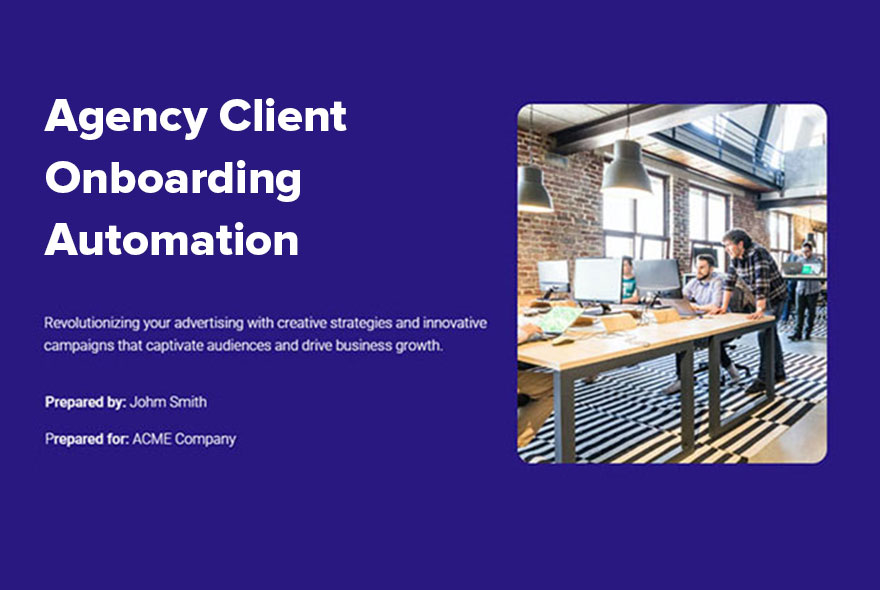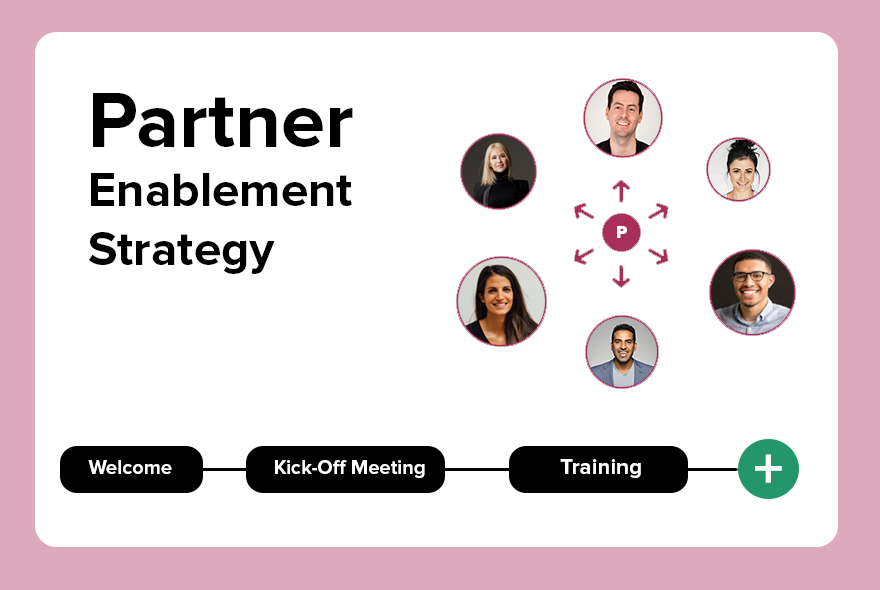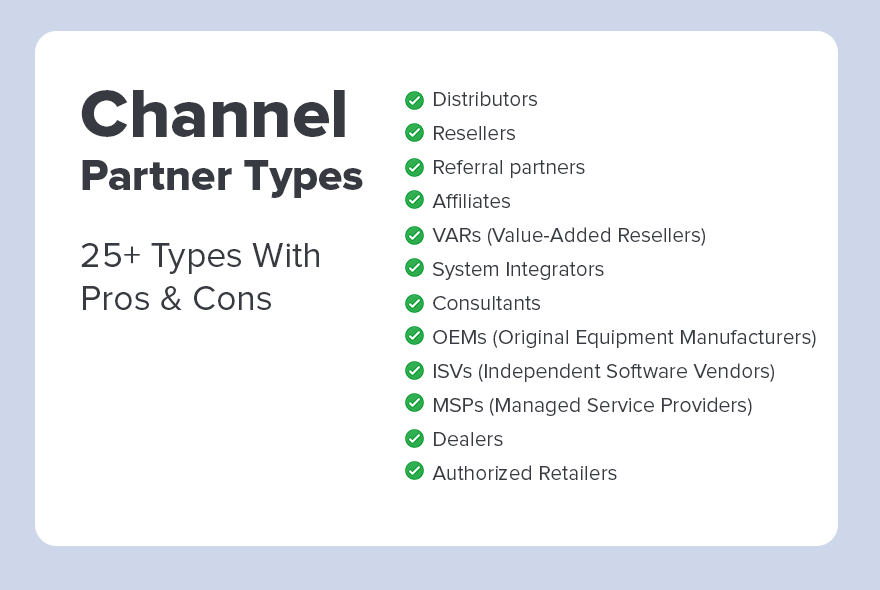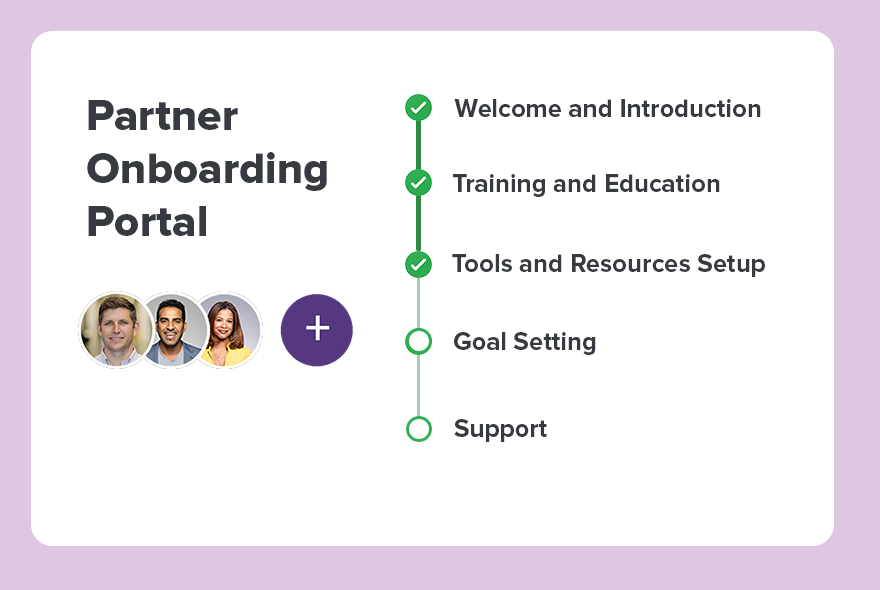Imagine your marketing agency client onboarding as a seamless journey, where every step unfolds effortlessly. Automating this process is like giving your clients a personalized map, guiding them smoothly from introduction to full engagement.
This not only elevates their experience but also frees your team to focus on creativity and growth. Dive into the transformative benefits of automation, a world where efficiency meets satisfaction, setting the stage for enduring partnerships.
Table of Content
- What is Agency Client Onboarding Automation Process?
- Are You Performing the Same Tasks for Each Client?
- From Manual to Standardized and Automated Client Onboarding
- Client Onboarding Flow Template
- Main Phases In Agency Client Onboarding Process
- How to Create the Best Client Onboarding Process For Marketing Agency
- What Can Be Automated?
- How to Automate Client Onboarding Template
- Tracking Client Activity
- Role Of AI In Agency Client Onboarding
- 11 Reasons to Automate Client Onboarding For Agency
- What Are the Benefits of Automating Agency Client Onboarding?
- One Client Portal, One Source of Truth
What is Agency Client Onboarding Automation Process?
Marketing agency client onboarding automation is designed to efficiently welcome new clients, clarify onboarding procedures, and ensure a quicker, more streamlined onboarding process.
This process utilizes virtual sales deal rooms to present various agency onboarding processes, guaranteeing a smooth and effective experience for new clients.
The goal is to centralize all essential information in one portal, allowing clients to easily understand the agency’s processes and start benefiting from its services as soon as possible.
In this blog, we’ll explore the benefits of automating the marketing agency client onboarding process, and how to implement it effectively.
For details about social media client onboarding, including tips, strategies, and how our portal can streamline every step, please visit social media client onboarding
. This resource is designed to enhance your effectiveness as a social media manager and elevate your clients’ experience from the start.
Are You Performing the Same Tasks for Each Client?
How do you prepare for a new client? Continually performing the same tasks for each client not only drains resources but also stifles creativity and innovation within marketing agencies.
Manual repetitive tasks
- Creating quote or proposal
- Sending documents for signing
- Collecting the same data for campaign form the each client
- Approving campaign creatives
- Planning weekly content creation
- Campaign Setup
- Reporting (monthly or weekly)
- Invoicing
It’s time for agencies to break free from this cycle, embracing a more tailored and efficient approach to client management and professional service delivery.
Create Customer Onboarding Automation That Follow Your Requirements
From Manual to Standardized and Automated Client Onboarding
The transition from manual to standardized and automated agency client onboarding marks a pivotal shift in how marketing agencies manage new client integrations.
This change makes the marketing agency client onboarding process smoother, turning what could be a varied and lengthy set of tasks into a consistent, efficient experience.
Client Onboarding Flow Template
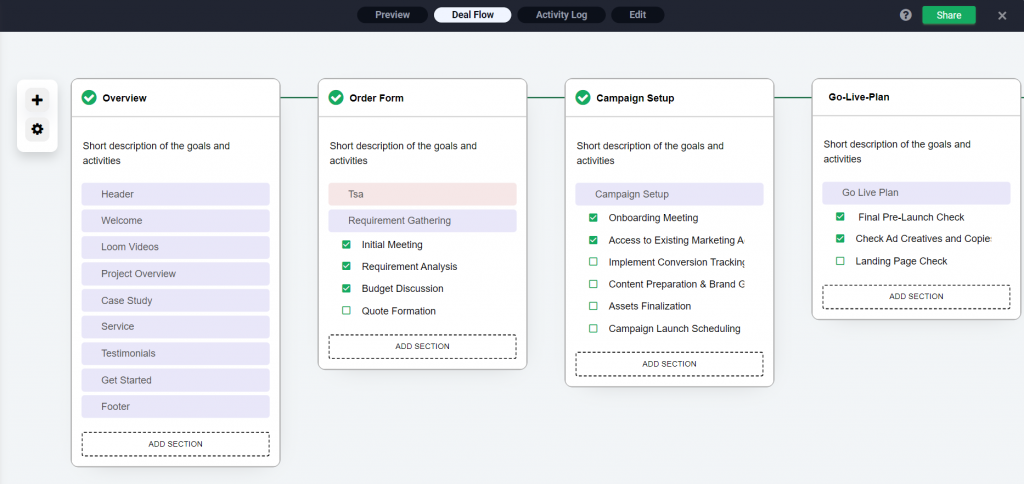
Create Client Portal For Your Agency And Automation Onboarding Process
Eliminate delays by sharing a mutual action plan with all key stakeholders. Standardize processes, automate notifications, and create a transparent onboarding plan.
Try Now ― It’s FreeMain Phases In Marketing Agency Client Onboarding Process
Phase 1: Welcome and Introduction
Personalized Welcome: Kick things off with a personalized welcome message. This can be an email, a video message, or even a small welcome package sent to their office. The key is to make them feel valued and excited about the partnership.
Phase 2: Information Gathering
Client Needs and Goals: Have a structured form or questionnaire to collect detailed information about the client’s business, their needs, and their goals. This ensures you’re both on the same page from the get-go.
Documentation Collection: Clearly list the documents and access permissions your team needs to start working. Using a secure platform for this exchange is crucial.
Phase 3: Setting Expectations
Scope of Work: Outline the scope of work in clear, understandable terms. This includes deliverables, timelines, and any milestones
Communication Plan: Establish a communication plan detailing how often updates will be provided, and who to contact for different issues. This keeps everyone informed and accountable.
Phase 4: Onboarding Session
Product/Service Walkthrough: Arrange a walkthrough of your product or service. This could be a live demo or a series of tutorial videos, depending on the complexity of your offering.
Create Mutual Action Plan and Share It With Client
Phase 5: Follow-up and Feedback
Initial Feedback: After the first week or after the first major milestone, reach out for feedback. What’s working well? What could be improved? This demonstrates your commitment to their satisfaction and can help nip potential issues in the bud.
How to Create the Best Client Onboarding Process For Marketing Agency
Creating a mutual action plan (MAP) and sharing it with your client is a strategic step that enhances transparency, accountability, and collaboration in your partnership.
Instead of toggling between various tools such as Semrush, Hubspot, Google Analytics, and different social media platforms, a unified mutual action plan portal brings together data from all marketing channels into one cohesive environment.
This process involves outlining a detailed plan of action, agreed upon by both parties, that defines the path to achieving the client’s goals.
Here’s how to effectively create and share a MAP with your client:
Step 1: Kickoff Meeting
Engage in a collaborative planning session with your client. The aim is to co-create a roadmap that reflects both the client’s needs and your capabilities to meet those needs.
Step 2: Understand Client Objectives
Begin by understanding your client’s objectives, both short-term and long-term. Sending onboarding questionnaire can help.
Step 3: Assign Responsibilities
Clearly assign responsibilities for each task or action item in the plan. Identifying who is accountable for what ensures that all necessary actions are taken care of, and it helps in avoiding any confusion down the line.
Step 4: Timeline and Review Points
Set a realistic timeline for achieving the milestones, including specific dates for review points. Regular reviews allow both parties to assess progress, discuss any challenges, and adapt the plan as needed.
Step 5: Set Up Your Client Reporting
In the early stages with a client, we dive into understanding their key performance indicators (KPIs), then assist them in integrating their accounts with our platform. We guide them through our tracking process, explaining the what, how, and expected outcomes.
This process involves regularly updating your clients on progress, challenges, and successes related to their projects or services.
Here’s how to do it right:
- Choose the Right Tool
- Define Reporting Metrics & KPIs
- Create Centralized Client Portal
- Establish a Timeline
- Be Transparent
- Automate Where Possible
Step 6: Agency Project Setup (Checklist Approach)
Setting up a new project at a marketing agency requires a structured approach to ensure success from the get-go.
This approach gives you a clear view of your progress, making a great impression.
- Access Permissions: Request access to the client’s digital marketing platforms, social media accounts, and analytics tools.
- Team Assignment: Assign specific team members to different aspects of the project, ensuring clear roles and responsibilities.
- Tool Integration: Integrate client accounts with the agency’s marketing tools and software for seamless data analysis and campaign management.
- Campaign Strategy Development: Develop a comprehensive marketing strategy based on the client’s goals, target audience, and market analysis.
- Email Marketing Setup: Configure email marketing campaigns, including segmentation, personalized content, and automation flows.
- Ad Account Setup: Set up and configure ad accounts for Google Ads, Facebook Ads, or other platforms as per the campaign needs.
- Create Client Portal: Set up the project in a project management tool, creating tasks, deadlines, and milestones for clear tracking.
- Launch Plan Finalization: Finalize and review the launch plan with the client, ensuring all elements are in place for a successful campaign start.
What Can Be Automated?
Post Demo Follow-up
Automating post-demo follow-ups ensures timely and personalized communication with potential clients. This can include sending thank you emails, providing additional resources, or scheduling the next steps, all designed to keep the conversation going and convert interest into action.
Proposals & Quotes
Creating and sending proposals and quotes can be automated to save time and reduce errors. Automation tools can generate customized proposals based on predefined templates and client information, allowing for quicker turnaround times and consistent presentation.
Automating the process for initial quotes and proposals not only saves a substantial amount of time but also enhances the customer experience. This improvement makes it more likely that customers will select your agency for a long-term partnership.
Customer Onboarding Process
The customer onboarding process can be significantly streamlined through automation. This might include:
- Sending welcome emails
- Guiding new customers through initial steps
- Providing access to necessary resources
- Setting up accounts
- Campaign setup
- Privingin video materials
- Sharing onboarding checklist
Campaign Setup Checklist
Campaign setup process checklists ensure that every step is completed correctly and nothing is missed. This can include task assignments, deadline reminders, and progress tracking, helping teams stay organized and on schedule.
Client Mutual Action Plans
Automation can help manage and track client mutual action plans, ensuring that both the agency and the client know their responsibilities, milestones, and deadlines. This fosters a collaborative environment and keeps projects moving forward effectively.
By automating these and other onboarding tasks, marketing agencies can reduce manual workloads, minimize errors, and ensure a consistent and high-quality experience for every new client. This not only improves operational efficiency but also enhances client satisfaction and retention.
How to Automate Client Onboarding Template
Step 1: Choose pre-built Deal Room template or create your own
A pre-built agency customer onboarding template from our Deal Room Library can serve as a starting point, whereas creating and customizing your own template allows you to meet the specific needs of your agency.
Step 2: Split onboarding into phases
Breaking the onboarding process into manageable phases helps in organizing and prioritizing tasks. It makes the process more understandable for both your team and the client, facilitating smoother progress tracking.
Step 3: For each phase define tasks, responsibilities and processes
Clearly outlining what needs to be done, who is responsible, and how tasks should be completed ensures accountability and efficiency. This step is crucial for maintaining clarity and avoiding overlaps or gaps in the onboarding process.
Step 4: Launch standardized onboarding portal for a new client in one click
That’s it! Standardized agency client portal is ready for sharing. This will create a great onboarding experience, providing clients with a single access point to all necessary information, tasks, and communication channels.
Tracking Client Activity
Monitoring client interactions and engagements is crucial for tailoring services and responses. Discover how tracking client activity can unveil insights, enhance relationships, and drive business growth.
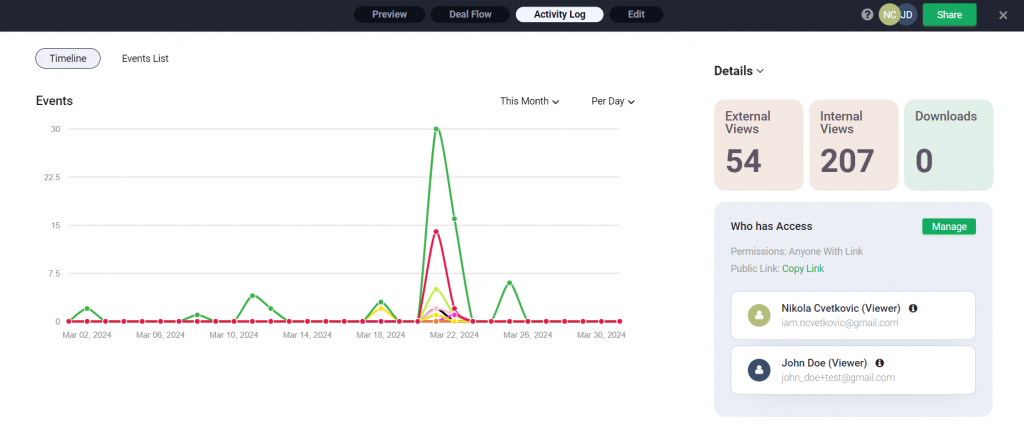
Role Of AI In Agency Client Onboarding
Bringing Artificial Intelligence (AI) into the mix is changing the game for how agencies welcome and work with new clients. It’s making everything smoother and more efficient, and it’s really stepping up the game in making clients happy.
AI can automate the initial stages of client onboarding and data gathering about the client’s business, needs, and goals.
This reduces manual entry errors and saves time, allowing agencies to focus more on strategy and less on administrative tasks.
AI can help with:
- Automated Data Collection
- Personalized Communication
- Efficient Document Processing
- Predictive Analytics
- Enhanced Onboarding Experiences
11 Reasons to Automate Client Onboarding For Agency
For marketing agencies, creating standardized onboarding templates for new clients is a significant time-saver.
Why should you standardize client onboarding?
- Save time, automate initial proposals and quotes
- Close deals faster
- Streamlines the welcome experience for new clients in a few clicks
- Create clear agency client onboarding process
- Let your clients find everything in one place
- Speeds up the client setup process
- Reduce manual repetitive tasks
- Allow clients to access services faster
- Keep clients informed throughout the onboarding process
- Always know what is next step
- Onboard more customers in less time
What Are the Benefits of Automating Agency Client Onboarding?
Shorter Sales Cycles
Streamlining early agency client interactions can greatly shorten the time from a lead’s first interest to the final sale. This efficiency results in faster sales cycles, allowing businesses to guide leads through the sales funnel more effectively.
Faster Client Onboarding
Automating agency client onboarding process not only speeds up administrative tasks like account setup and data entry but also ensures that clients can quickly access and start using your services. This rapid transition from signing to service usage enhances client satisfaction and sets a positive tone for the business relationship.
Enhanced Scalability
Client onboarding automation for agencies allows businesses to handle an increasing number of clients without a corresponding increase in workload or resources. By streamlining repetitive tasks and workflows, companies can scale their operations efficiently, accommodating growth without sacrificing service quality or operational integrity.
Track Buyer Engagement
With agency onboarding automation, businesses can easily monitor and analyze how buyers interact with their marketing and sales efforts. Tracking engagement through automated systems provides valuable insights into buyer behavior, preferences, and readiness to purchase, enabling more informed sales strategies and marketing adjustments.
Unique Buyer Experience
Agency Customer onboarding tools can personalize communication and marketing efforts at scale, allowing businesses to offer a unique and tailored buying experience for each customer.
One Client Portal, One Source of Truth
Adopting a “One Portal, One Source of Truth” philosophy not only streamlines customer onboarding but also builds trust with marketing agency clients.
It demonstrates an agency’s commitment to accountability and precision, critical factors in establishing and maintaining long-term partnerships.
Accelerate Time-To-Value, Onboard Customers Faster
Minimize the learning curve and accelerate customer journey. Ensure seamless onboarding process and a faster return on investment.
- Faster customer onboarding
- Efficient collaboration
- Transparent process
